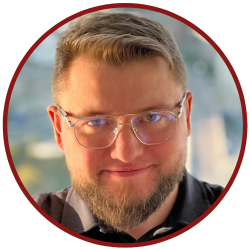
Anton Turupalov is a political consulting and government relations professional in Ukraine with extensive experience in public service. He has previously served as Deputy Mayor of Mykolayiv, Advisor to the Minister of Healthcare of Ukraine, and Advisor to the Head of the Parliament of Ukraine. Anton's expertise lies in regional policy and local administration. As a key advisor on regional policy to the former Prime Minister of Ukraine, he played a pivotal role in implementing groundbreaking system changes, including land and administrative reform. Anton organized Ukraine's first coronavirus isolation facility during the COVID-19 pandemic under challenging circumstances. Following the full-scale invasion of Ukraine by Russia in February 2022, Anton co-organized the Assistance Coordination Center in Warsaw, a hub for coordinating humanitarian aid between Ukrainian and Polish authorities, international donors, and organizations. Currently based in Warsaw, Anton serves as an advisor to the Minister of Agriculture and Food of Ukraine.
Project Description: Anton is spearheading the creation of the Ukrainian Endowment for Democracy (UED), a platform dedicated to protecting and developing democracy in Ukraine. The UED aims to promote the transformation of the political system, establish effective institutions, and introduce equal rules of the game to build sustainable democracy. The Endowment’s mission is to promote democratic institutions, foster economic development, and support the political system’s evolution. UED will bring together responsible businesses and experienced reformers to address systemic national problems, shape the national agenda, partner with international organizations, and work on two fronts: promoting democracy and building a strong economy. It will support the development of democratic institutions, political parties, civil society organizations, and independent media, and promote Ukraine as a regional leader of democracy, as well as support Ukraine’s integration with Europe and the West.
In addition to establishing the UED, Anton is working on a secondary project focused on improving the efficiency, transparency, and responsiveness of reconstruction and humanitarian aid efforts in Ukraine. The project aims to develop a one-stop-shop system connecting international donors, relevant national government ministries, agencies, and local actors (region, town, and community-level stakeholders). This platform will enable a more transparent, efficient, and responsive mechanism for coordinating aid efforts in Ukraine, reducing corruption, improving prioritization, lowering net costs, and facilitating communication of needs and systemic issues by local administrations.
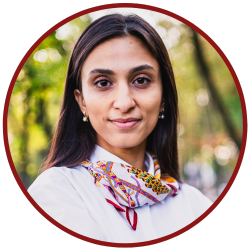
Gulsanna ("Sanna") Mamediieva led strategic planning and European integration of the digital sector of Ukraine as Director General for EU Integration at the Ministry of Digital Transformation of Ukraine. She played a significant role in Ukraine’s integration into the EU Digital Single Market and the rapid digital transformation of Ukraine, including building the government ecosystem “Diia” (The State and Me), which makes it easy and secure for Ukrainians to obtain digital documents (driver’s licenses, passports, etc.), access public services online (such as paying taxes, business registration), developing digital skills, electronic communication and growth of ICT industry. This influence made Ukraine one of the world leaders in public innovation and, without exaggeration, European “digital tiger.” It also served as a backbone of Ukrainian resilience during the COVID-19 pandemic and wartime. Since February 2022, she has coordinated international technical assistance to support Ukraine’s digital resilience. Gulsanna also initiated exporting Ukrainian digital transformation experience to other countries. The first case is with Estonia, which will present its government state application, “Mrik,” which is based on Ukraine’s “Diia” app. Gulsanna currently serves as an Advisor to the Vice Prime Minister on Innovation, Technology and Education, and to the Minister of Digital Transformation of Ukraine. She is also Director for Programs and Partnerships at Digitally GovTech Center of Excellence, a member of the Council of Europe’s Committee on Artificial Intelligence, and Coordinator for Ukraine at Eastern Partnership Harmonization Digital Market initiative. She was a Visiting Fellow at the McCourt School for Public Policy at Georgetown University before arriving at Stanford this summer. She holds a Master’s degree in Information Technology Law from the University of Tartu, Estonia, and is pursuing a Ph.D. in Internet Law at Carleton University in Canada. Before her government role, Gulsanna worked as an IT lawyer at DLA Piper Ukraine, specializing in ICT and Intellectual Property.
Project Description: Sanna has a number of tech policy areas of interest. She would like to learn more about innovation strategy development, edTech, govTech, military tech, AI for public purpose, saving ecosystems, biotech and medtech, and innovation parks. She is also interested in developing solutions and learning about comparative practices for upskilling and reskilling displaced people, mostly women, with a specific focus on the ICT sector. She has been very involved in building Ukraine’s digital capacity and IT sector development. Sanna is also interested in helping to build further digital capacities for better governance at both the local and national levels. To achieve this, she is keen on connecting with individuals in California, including local government representatives, who are engaged in similar efforts. She is also eager to connect with women in the Bay Area who have participated in ICT-related retraining and reskilling initiatives.
Gulsanna is interested in technology around elections, blockchain, and security that would be involved in structuring a way in which all displaced Ukrainians might have the opportunity to vote in the next round of presidential and/or parliamentary and local elections. She endeavors to understand the risks and benefits of such a system and, thus, is interested in connecting with experts in technical/computer science who are conversant in blockchain and e-voting, if only to explain why these ideas may not work that well. She is also interested in digital diplomacy, promoting and sharing Ukrainian digital transformation experiences.
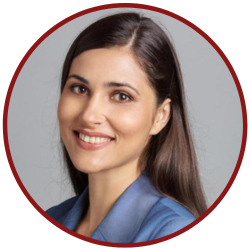
Halyna Yanchenko was elected to the Ukrainian Verkhovna Rada (Parliament) in 2019 and is the Deputy Chair of Sluha Narodum “SN” (Servant of the People), a centrist, pro-European and anti-corruption Party. Shortly after her election, Ukraine’s president, Volodymyr Zelensky, tapped her to lead government investment efforts. In January 2022, she was appointed as a Secretary in the National Investment Council of Ukraine. In addition, she chairs the Temporary Special Commission of the Verkhovna Rada on protecting investor rights. Prior to being elected to the Verkhovna Rada of Ukraine, she led the Civil Oversight Council at the National Anti-Corruption Bureau of Ukraine. In 2014-2015 was a deputy of the Kyiv city council. Halyna earned a Master’s Degree in Sociology from the National University Kyiv-Mohyla Academy. She also studied for one year at Wichita Falls High School in Texas.
Project Description: Halyna has many interests and was an important voice in the political process that led to the creation of “Diya” (a state cell phone application that has electronic IDs and provides public services to citizens and businesses) to make it easy and secure for Ukrainians to obtain digital drivers’ licenses, passports, health cards, and the like. This was very successful, and Ukrainians can now do all of this on their smartphones. Building on this success, Halyna is interested in using technology to assist in quickly employing veterans and returning displaced Ukrainians post-war. She is interested in engaging foreign investment for the recovery of Ukraine. She also wants to learn more about platforms and systems that can match skills with reconstruction priorities (as well as helping to map out those priorities). She would benefit from making connections in the private sector, including tech companies that could be helpful in these areas, as well as learning more from people who have worked in post-conflict zones on reconstruction priorities and organization. She also seeks to meet with emergency and disaster preparedness and recovery organizations at the state, federal and local levels or other contacts who may have experience in some of these areas.
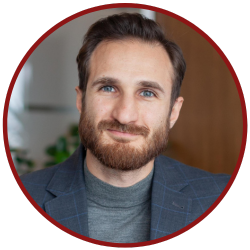
Konstantyn ("Kostya") Chyzhyk is a Partner at British-Ukrainian law and consultancy firm Hillmont Partners, helping international companies develop business in Ukraine and advising the government and the parliament on economic and judicial reforms. As Deputy Minister of Energy and Ecology, Konstantyn coordinated European integration, investments, digital transformation, and security, worked on renewable energy sector stabilization and reform, launched new auctions on gas extraction, and managed the largest sectoral loan and grant portfolio in the government of $1.2B. As Deputy Head and later as Head of the Investment Promotion Office under the President of Ukraine, Konstantyn unlocked and secured more than $1B of foreign direct investments. As Head of Communications and International Relations of the Ministry of Finance, he promoted IMF-backed reforms and managed cooperation with investors and the IMF, World Bank, EBRD, and EIB.
Project Description: Kostya wants to use his time at Stanford to develop a new vision for ways in which to attract foreign direct investment to Ukraine. He is interested in learning more about strategic, sectoral, and institutional policy and regulatory frameworks that Ukraine would need to have in place in order to attract foreign capital post-war. He is keen on engaging with professionals from private equity and venture funds. Additionally, he seeks to connect with regional authorities, both at the state and local levels, if applicable, who are actively involved in economic development and the promotion of foreign direct investment (FDI). Kostya's intention is to gain insights from California's initiatives in this realm and also understand more about the factors that investors prioritize when considering investment in post-conflict areas.
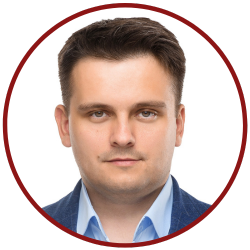
Mykhailo Pavliuk is vice-chairman of the Chernivtsi Oblast (state) legislature in Ukraine. Among his central duties is the protection of the mutual interests of communities (known in Ukrainian as hromadas) and local governing bodies. His interests have long been focused on Euro-Atlantic integration, decentralization and deconcentration of authority in Ukraine, and the engagement of public and non-governmental organizations in policymaking. As acting Governor of the Chernivtsi Oblast State Administration in 2018-2019, Mykhailo focused on the creation of a successful administrative structure of new, capable, self-sufficient communities. In 2006-2010 shortly after his university graduation, he also organized long-term public discussions about the advantages for Ukraine of European Union and NATO membership. In his spare time, Mykhailo volunteers to deliver humanitarian aid to liberated areas of Ukraine and to the Armed Forces of Ukraine. He also supports internally displaced persons in Chernivtsi and coordinates their resettlement.
Project Description: Mykhailo’s project is about local self-governance — its decentralization, finalization, and implementation in the post-war period in Ukraine. He wants to learn more about checks and balances between executive and local self-governance in the United States, how to empower self-sufficient communities (hromadas in Ukrainian, which are literally community-based forms of governance) and enrich them with practices of good governance (transparent, responsive and efficient), and also ways in which to engage citizens in local public issues. During his time at Stanford, he is interested in meeting with local government representatives in Palo Alto, Menlo Park, and Mountain View, as well as state (California) government actors to understand better how (or whether) this works here.

Olena Kutsai is a lawyer with more than 15 years of experience in the international corporate sector, including work for Chevron and Scorpio Real Estate corporations. Olena currently serves as a Member of the Secretariat of the Business Ombudsman Council of Ukraine and is a Member of the Peace Coalition. In the Business Ombudsman Council, Olena leads high-level dialogues focused on improving the business environment in Ukraine. She is responsible for strategic cooperation with a number of stakeholders, including the Ministry of Digital Transformation and the Ministry of Ecology and Natural Resources. Olena drives several special initiatives to support the reconstruction and recovery of Ukraine following Russia’s invasion in 2022. She also develops policy recommendations promoting good governance, sustainable development, and the rule of law in Ukraine, working with the Government of Ukraine, Verkhovna Rada (parliament), the Office of the President of Ukraine, business associations, non-governmental institutions, international financial institutions (World Bank, EBRD), and international development organizations such as USAID and Agriteam. Olena is an author and co-author of the Council’s educational webinars and training for the private and public sectors. She holds a Master’s of Public Administration from the Ukrainian Catholic University and a Master’s of Law from the Eastern European University. Olena is a graduate of the Center on Democracy, Development and the Rule of Law’s Leadership Academy for Development (Stanford University) and an advanced leadership course at Harvard Business School.
Project Description: Olena has an extensive background in business development and business advocacy. Her primary interest revolves around exploring effective strategies to reconstruct and revitalize the business community in Kherson, a region in southeastern Ukraine liberated from Russian occupation in the spring of 2022. Her overarching goal is to create models that can be scaled, adapted, and implemented in other parts of Ukraine.
Her past work has been focused on helping businesses forced to relocate from occupied or conflict-ridden areas of Ukraine. She helped these businesses secure new operational spaces, access essential services like electricity and internet, and rebuild disrupted supply chains to resume production. In Kherson, specific challenges arise due to the aftermath of flooding caused by the Russian military's destruction of the Khakovka Dam on June 6, 2023. Alongside her focus on business recovery, Olena also seeks to address the cleanup and restoration of vital services like electricity and internet, as well as the rebuilding of other infrastructure destroyed in the flooding.
Given the significant environmental damage in Kherson, Olena has found value in connecting with experts in food sustainability at Stanford, as well as climate and environmental scientists like David Lobell. She also seeks to engage with and learn from individuals with experience in disaster cleanup and recovery, both within California and on a national and international scale.





















